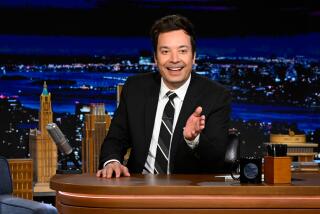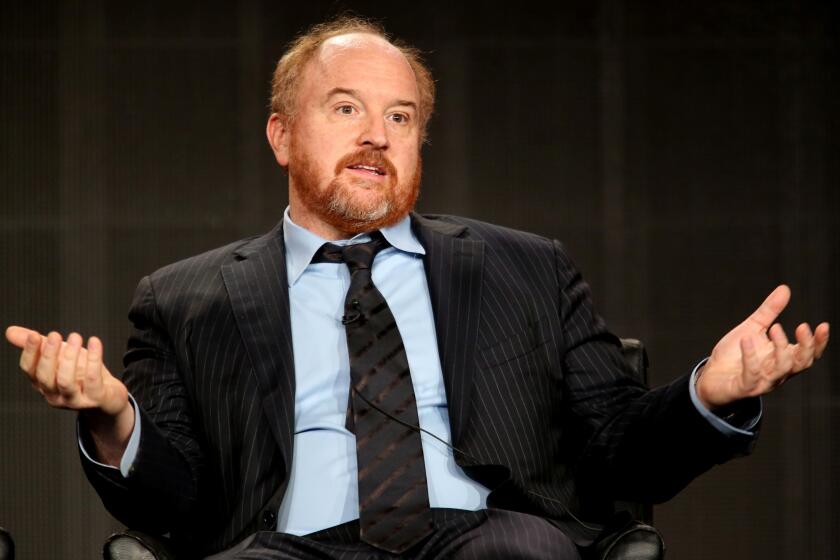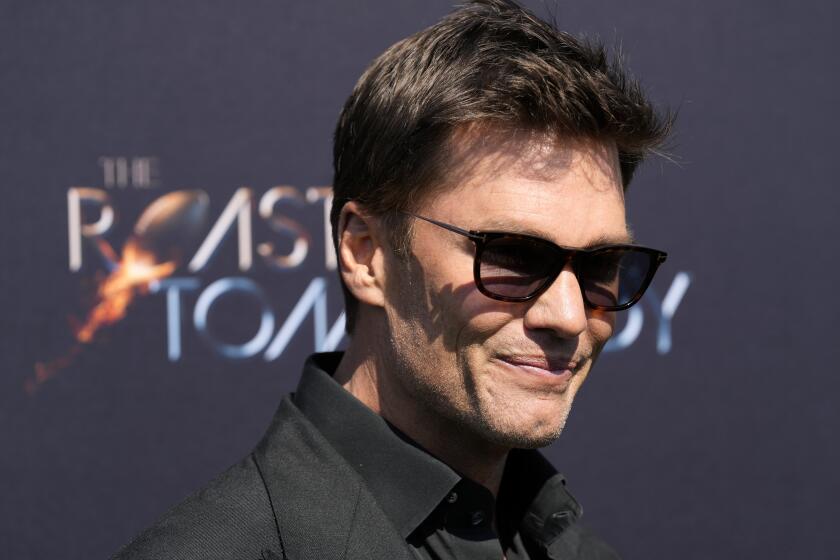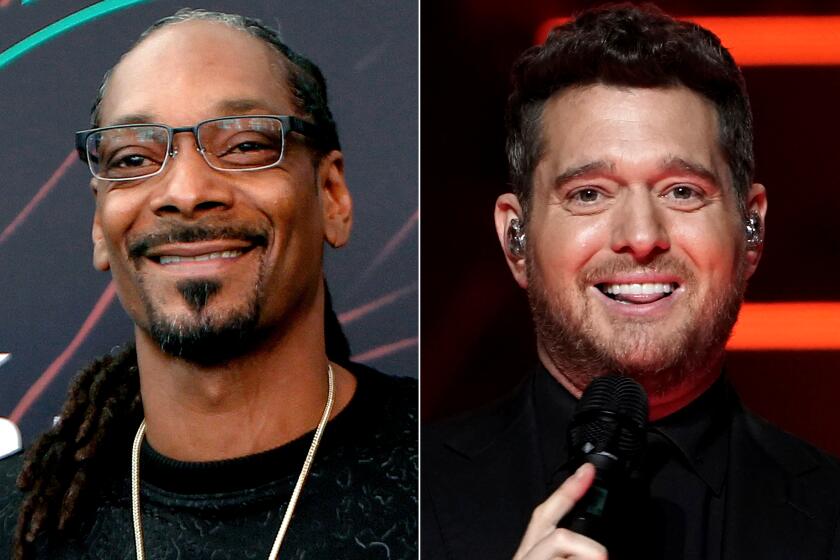Show Biz Right’s Victory Funk
On what they regarded as the dark morning of Wednesday, Nov. 4, 1992, a small band of conservative players in and around the entertainment industry conceived the idea of uniting in a kind of support group to see themselves through the gathering gloom of the Clinton years. The Wednesday Morning Club, as it came to be called, was the ultimate novelty: a right-wing political community nested in the very heart of left-wing Hollywood. With membership that quickly grew into the hundreds, the organization thrived on lively debate, meeting for meals to cheer the polemic of speakers like commentator Ann Coulter and National Rifle Assn. executive vice president Wayne R. LaPierre. More than anything, though, they took comfort in shared lore about the oppression of show business conservatives by triumphalist show business liberals.
With the ascendancy of George W. Bush, you might suppose the Wednesday Morning gang and others on the tinseltown right were finally enjoying a triumphant moment of their own. But you’d be wrong. Just four months into the post-Clinton era, Hollywood’s wary conservatives are lost in a weird sort of victory funk. Instead of rallying behind Arnold Schwarzenegger’s on-again, off-again run at California Gov. Gray Davis, the club has been jolted by a rift between executive director David Horowitz and co-founder Lionel Chetwynd, who quietly left the group in December. Even some of the entertainment community’s biggest Bush-backers, inside the Club and out, have been flummoxed by the new president’s apparent allergy to the glamour circuit. Indeed, several conservative stalwarts who had campaigned actively for Bush last week said they weren’t even aware that he had announced a post-Memorial Day trip to California, his first to the state after losing it to Al Gore by an embarrassing 12 percentage points.
“I didn’t know about it,” one major movie industry Republican said when told of the trip last week. “There was something scheduled in March, and they called me. But I guess that fell through.”
Certainly the Bush policy of benign neglect has taken its toll on Hollywood, which demands constant kisses and contact. “He hasn’t sent invitations or initiated coffees or whatever. There’s been no interface,” complains the movie Republican, who declines to be quoted by name. Built around a Los Angeles town meeting to discuss trade and education and a San Diego talk on military affairs, the current trip doesn’t appear calculated to appease film types hungry for face time.
Yet the malaise in conservative circles is rooted in something deeper than the certitude that neither producer Frank Price nor Charlton Heston nor conservative producer/manager Douglas Urbanski--no matter how hard they may have worked for Presidential victory--will ever have a Markie Post moment on Lincoln’s old bed.
A movement founded in opposition, Hollywood conservatives are suffering from the loss of a glorious political enemy in Bill Clinton. To resist is much easier than to lead. Furthermore, the show business right, with its friends in power, seems pained by the dismantling of its core myths about oppression and exclusion by the left. This is about common purpose--and the dawning realization that without its finely honed sense of persecution by the liberal show business establishment, the Hollywood right doesn’t really have one.
“The liberal community tends to be clustered on the left. We tend to be spread across the entire area from right of center on out, and that sometimes creates strain,” says Chetwynd, a seasoned writer-director, who, while many in Hollywood are still waiting for their piece of George W.,was asked with several allies to the Bush White House for a screening of his Showtime film “Varian’s War,” about the rescue of Jewish artists in wartime France. In a delicious twist, hitherto consummate insider Barbra Streisand, one of the film’s producers and a vocal Bush antagonist, wasn’t among the guests. Yet the reversal seemed only to prove that the bad old days--when, for instance, studio chief Mark Canton could tie a contract renewal at Columbia Pictures to a demand for Clinton donations in the amount of $1,000 from a producer and $500 from his chief executive (myself, as it happens)--were really over.
Indeed, while nobody was paying particular attention, both the amount and the percentage of show business donations channeled to Republicans shot up over the last decade, slowly undercutting the outsider sensibilities that once bound Hollywood conservatives to groups like the Wednesday Morning Club or Horowitz’s Center for the Study of Popular Culture.
According to the Center for Responsive Politics, Republicans received $13.7 million from the television, movie and music industries in 2000, compared with $24.2 million for the Democrats, giving the GOP 36% of the two-party kitty. In 1992, Republicans grabbed just 25% of the pot, as they collected $3.3 million to the Democrats’ $9.8 million.
For all the talk about liberal witch hunts within the entertainment business, folks on the right-hand side of the ledger were clearly “coming out,” checkbooks in hand, throughout the Clinton era. Helped along by anti-Clinton sentiment, the aggrieved conservative micro-culture came to account for more than one-third of measurable political activity within the industry. Nor was there ever much evidence that libertarian or Republican-oriented players like Kurt Russell or Schwarzenegger or even much-lesser known talent were ever denied jobs because of their convictions. Famously un-left-leaning writer John Fasano might delay the start of a development meeting by dumping a bag of handguns on an executive’s table for a quick sermon on the virtues of readiness (as he once did in my presence); but those politically incorrect antics certainly didn’t cost him work on “The Hunley” or “The Hunchback” for Turner Network Television, nor on feature scripts for studios all over town.
With the myth crumbling, Hollywood conservatives must now figure out what they’re really all about. And that’s where things get sticky. While the Sarandons and Baldwins and Streisands have generally moved in lockstep around issues like abortion and affirmative action, the Hollywood right has stubbornly refused to line up behind almost any easily enforced agenda. Many show business conservatives, for instance, are firmly pro-choice, and very few were enthusiastic about calls for a new moral code for the entertainment business, even before Democrats like U.S. Sen. Joseph I. Lieberman confused the issue by out-preaching William J. Bennett, while turning eternal Democrat Jack Valenti into a solid backer of the let’s-not-even-go-there Bush position.
While agreeing that entertainment conservatives tend to be “libertarian and open-minded,” the irrepressible Horowitz maintains that liberal repression is still what keeps the entertainment community’s right wing from blossoming. Citing backlash against singer Ricky Martin for entertaining Bush at the Lincoln Memorial--”His own writing partner said no Puerto Rican should ever support a Republican,” reminds Horowitz--the activist says even the “Michael Eisners and Sherry Lansings,” major corporate players with a vested interest in good government relations, have been slow to embrace Bush because of the ongoing blackball.
“This can’t happen in the natural way it ought to happen because of the McCarthy-like atmosphere. Normally, a lot of people in Hollywood would be saying this is not such a bad Republican. They can’t do it,” insists Horowitz.
Even some of the faithful, however, say that Horowitz--host of the egregious slaphillary.com, wherein online visitors are invited to “slap” a google-eyed Sen. Hillary Rodham Clinton--managed with his recent anti-slavery reparations crusade to sow as much trouble among local show business conservatives as the left’s Hidden Hand. “I really didn’t feel good about it,” says an agent who, despite conservative leanings, says he avoids the club, largely because of such antics.
Horowitz counters that he’s encountered no backlash from within. “I’m amazed. I was sure the country club Republican types ought to be running for the tall grass. But they haven’t,” he said.
Neither Horowitz nor Chetwynd would discuss their rift, which accompanied a shake-up that saw producer Price and attorney Bruce Ramer also leave the Wednesday Morning board, even as Urbanski and others whom Horowitz declines to identify, citing fear of left-wing reprisal, signed on. (Asked whether he had experienced any such political reprisals from liberal Hollywood, Chetwynd insisted not. “My career flourished” while in the club, he said.) Yet the break-up is clearly just one more source of chagrin for the conservative show business community in what should be its moment of glory.
“There’s no lock-step at all,” shrugs Chetwynd. “And some would say that’s the problem.”
More to Read
The biggest entertainment stories
Get our big stories about Hollywood, film, television, music, arts, culture and more right in your inbox as soon as they publish.
You may occasionally receive promotional content from the Los Angeles Times.






